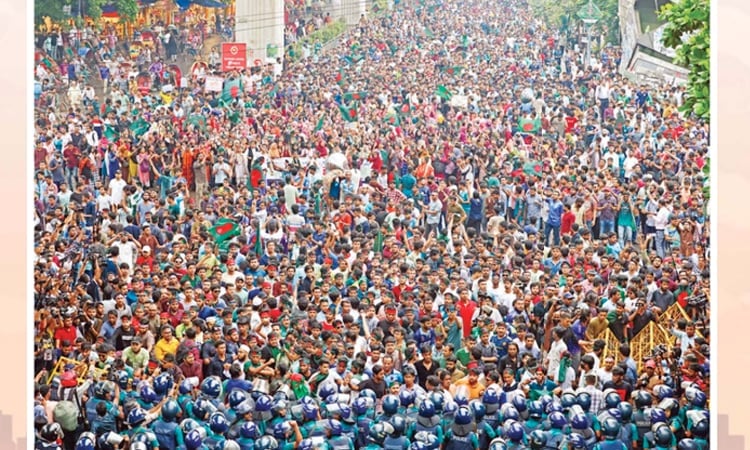News Flash
News Flash

DHAKA, July 10, 2025 (BSS) - Students observed the "Bangla Blockade" programme on July 11 last year breaking police barricades demanding quota reform in government jobs while clashes between law enforcers and protesting students took place in several places in the country.
At least 50 protesters were injured across the country as police resorted to baton charges and fire tear-shells to disperse the demonstrators in different parts of the country, including in the capital city Dhaka, Cumilla and Chattogram. In Cumilla, police also fired blank shots to disperse the crowds.
The clashes ensued between police and the protesting students in the afternoon when the protesters were attempting to block different roads, highways and railways defying police barricades.
The protesters, in fact, observed their blockade programme ignoring the government call to return to their respective campuses, saying that the quota issue would be resolved following the Appellate Division's verdict.
Besides, police had warned protesters not to cause public suffering through the blockade, saying legal action would be taken against those participating in unlawful road blockades.
Students of public universities and colleges along with jobseekers had been staging demonstrations against the quota system in government jobs since July 1. They occupied key city intersections, major highways, and rail lines during their demonstrations while there were no obstructions from law enforcement agencies until July 10.
On July 11, in Dhaka, the demonstration was scheduled to begin at 3pm, but rain delayed the programme for 30 minutes. Students from Dhaka University (DU) started taking position at Shahbagh with procession from 3:30pm.
However, in the afternoon, police presence at Shahbagh increased notably. To prevent demonstrators from advancing toward Hotel Intercontinental, police set up barricades, deployed water cannons and armored vehicles.
According to protesters, when they began marching around 3:30pm, police warned that any attempt to cross the Shahbagh barricades would trigger stern action. Around 5pm, students broke through the barricades and took position under the Shahbagh Metro Station, forcing police to retreat.
At Shahbagh intersection, demonstrators chanted different slogans including, 'Police Diye Andolon, Bondho Kora Jabena', 'Voy Dekiye Andolon, Bondho Kora Jabena', 'Hamla Kore Andolon, Bondho Kora Jabena', 'Quota Na Medha, Medha Medha' and 'Moktijudder Banglai, Boishommer Thai Nai'.
Besides, students of Sher-e-Bangla Agricultural University, Jagannath University and Jahangirnagar University also faced police obstruction during the blockade.
Around 4pm, police charged batons on the protesting students near the second gate of Sher-e-Bangla Agricultural University, leaving at least 10 students injured.
At Jagannath University, the administration tried to prevent protest by locking the main gate. But students broke the lock open and joined the demonstration at Shahbagh.
Jahangirnagar University students brought out a protest procession around 4pm and blocked the highway until 7pm.
In Cumilla, clashes broke out between police and students in front of the Department of Archaeology building near Cumilla University around 3:30 pm. At least 13 students were injured.
In Chattogram, police charged batons on students of Chattogram University and its affiliated colleges, injuring at least seven students. But the student protesters regrouped and blocked roads near the city's No. 2 Gate area.
In Sylhet, police also charged batons on the students of Shahjalal University of Science and Technology when they tried to block the Sylhet-Sunamganj highway. At least five students were injured in the incident.
Besides, protesters from Rajshahi University blocked the Dhaka-Rajshahi rail route, students of Barishal University blocked the Dhaka-Kuakata highway, students of Islamic University blocked the Kushtia-Khulna highway and students of Khulna University took position at Khulna Zero Point.
Additionally, students of Jashore University of Science and Technology blocked the Jashore-Kushtia-Rajshahi highway, students of Gopalganj Science & Technology University (The than Bangabandhu Sheikh Mujibur Rahman Science and Technology University) blocked the Gopalganj-Tungipara road and students of Pabna Government Edward College blocked the Pabna-Ishwardi highway.
Meanwhile, Awami League General Secretary Obaidul Quader alleged that the quota reform movement was being turned into an anti-government campaign. "Through the so-called 'Bangla Blockade,' protesters are causing public sufferings," he said.
On the same day, the University Grants Commission (UGC) sent letters to vice-chancellors of all public and private universities urging them to bring protesting students back to class.
Besides, a press conference at the Madhur Canteen on Dhaka University campus, central leaders of the Bangladesh Chhatra League (BCL) alleged that the quota reform movement was manipulated politically.
BCL President Saddam Hossain in the briefing said they were ready to face those trying to use the movement to gain political mileage.
Home Minister Asaduzzaman Khan Kamal termed the quota reform movement as conspiracies against the government and urged students to return to classes.
"Many are now trying to use the students for their own motives. These are conspiracies. The students are meritorious. Why would they stand against the state? If there's damage to life or property, if there's arson or public suffering, the police can't remain silent," Kamal said.
On the same day, the High Court published the full verdict declaring the 2018 government circular abolishing quota in government jobs illegal. The verdict stated that the government had the authority to revise, reform, or restructure the quota system and its percentage.
The student protesters, however, were steadfast in their promise to continue their demonstrations until parliament enacts a law to reform the quota system, keeping five percent quota for underprivileged communities.
On July 11, Nahid Islam, a key organiser of the anti-discrimination student movement, announced that they would bring out processions and hold rallies in all educational institutions across the country at 4pm on July 12.